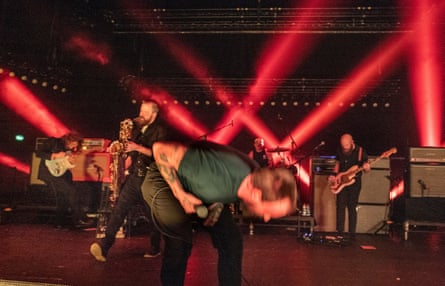Towards the end of Colossus, Idles’ hulking opening number, frontman Joe Talbot orchestrates a moshpit, ordering the crowd to carve out a no man’s land down the middle of the venue. “Are you ready to collide?” he roars. Then, more vehemently: “Are you ready to look after each other?” This combination of violence and compassion is Idles in a nutshell: go wild, be kind. Their shows feel like being punched and hugged at the same time.
Successful paradoxes always intrigue. The Bristol-born band have the brawn and dread of post-punk heavyweights such as Big Black or the early Bad Seeds, but none of their seething malice. Instead, and despite their musical differences, they recall the hoarse idealism of the Clash or 1980s U2: a life-and-death desperation to communicate, and to commune. It’s why they can fill Brixton Academy four nights in a row, and why many of the fans there have committed to inking the band’s name into their skin. Like no other British rock band of their generation, Idles offer a sense of resilient belonging, rendering pain fertile and ugliness majestic.
They have never sounded better. Talbot’s urgent sincerity, striking each syllable like he’s banging in a nail, is better suited to autobiography than explicit protest. After the humanitarian politics of their first two records, the brute-force sloganeering of 2020’s Ultra Mono landed awkwardly, he has admitted, because it was designed for live performance just before the pandemic rendered gigs impossible. While strength-in-numbers rallying cries such as War and Grounds certainly take off (“two fucking years we’ve waited for this,” Talbot says with unleashed glee), Idles’ latest album, Crawler, digs more fruitfully into personal struggles, specifically the singer’s 18 years of on-off addiction to alcohol and drugs. “This song, and most of our songs, is about drug addiction,” he jokes by way of introduction to Meds, one of several numbers elevated by Colin Webster’s saxophone agonies.
Now lean and sober, Talbot has the energy of a preacher who teaches kickboxing to young offenders. When he’s not stepping on a monitor, leaning as far forward as gravity will permit, he’s prowling the stage in front of a barricade of amplifiers or jogging on the spot. When he cries: “Can I get a hallelujah?” in The Wheel, a fraught song about inherited alcoholism, he could be at the pulpit; for Mr Motivator (“You can do it/ Yes you can!”), he’s Henry Rollins reborn as a personal trainer.

The frontman’s sharper edge translates to the whole band. Once known for crowdsurfing, semi-nudity, tears and looming chaos, Idles have solidified into a formidable machine. They can execute ramalama anthems such as Danny Nedelko as well as anyone, but Crawler has broadened their horizons, from the bug-eyed, 30-second blurt of Wizz, its lyrics collaged from text messages from Talbot’s former drug dealer, to the nauseous, waltz-time soul of The Beachland Ballroom, and the hip-hop-adjacent stomp of Car Crash. Guitarists Lee Kiernan and Mark Bowen are as interested in noise as they are in riffs, and the best tracks attain an immense industrial clamour: the dank clang of Bowen’s guitar paired with drummer Jon Beavis’s rattling suspense on Colossus, or the climax of Never Fight a Man With a Perm, which roughly approximates the sound of a helicopter lifting off from the roof of a collapsing building. Add a bank of machine-gun strobes, and the impact is physically overwhelming.
Idles’ particular brand of solidarity-building requires enemies, so there is indignant Tory-bashing (“there’s no point booing because none of them are here”) and a slightly jarring (but then I would say that) dig at “pseudo-intellectuals masquerading as journalists”. Perhaps the rather tedious class-policing allegations of inauthenticity that came their way a few years ago still rankle, but it’s hard to hear Talbot’s lacerating accounts of addiction and grief and question his bona fides. Then again, he wouldn’t be the first musician to draw strength from a sense of being disdained and misunderstood. A band like Idles needs pricks to kick against.
A case in point is I’m Scum, which weaponises derision into defiance. Talbot commands everyone in the venue, band included, to “get low” before springing up in unison for the finale. It’s a thrilling, hilarious moment that sums up Idles’ inspirational appeal to their tribe: you get knocked down, you get back up again. “Do not go gentle,” Talbot says, quoting Dylan Thomas before the final song, as if there were ever any danger of that.

Comments (…)
Sign in or create your Guardian account to join the discussion